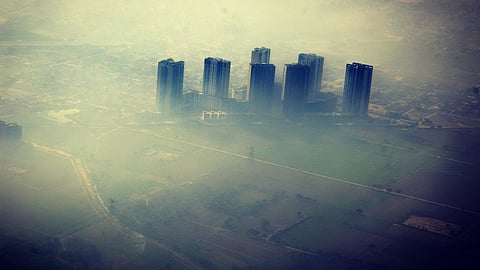

On November 18, the Supreme Court of India took a firm stance against rising pollution levels in Delhi-NCR, directing the Delhi government to enforce Stage-IV of the Graded Response Action Plan (GRAP) immediately. The apex court also ordered the formation of dedicated teams to ensure compliance with GRAP norms and suggested halting physical classes up to Class 12 in Delhi and nearby states.
A bench comprising Justices Abhay S. Oka and A.G. Masih emphasized that all possible measures must be taken to combat the region’s hazardous air quality, with the Air Quality Index (AQI) crossing 450—classified as ‘severe-plus.’
The Graded Response Action Plan, formulated in 2016 by the Environment Pollution (Prevention and Control) Authority (EPCA) and notified in 2017, is a set of measures aimed at tackling pollution. It classifies air quality into four distinct levels based on pollution severity.
Stage I – Poor (AQI 201-300)
Stage II – Very Poor (AQI 301-400)
Stage III – Severe (AQI 401-450)
Stage IV – Severe-Plus (AQI >450)
Stage-IV is triggered when air pollution reaches emergency levels, necessitating stringent actions to curb emissions and protect public health.
With GRAP-IV in effect, several restrictions have been imposed:
Vehicle Restrictions: Truck movements into Delhi are banned, except for essential goods and clean-fuel vehicles. Non-essential light commercial vehicles and medium to heavy goods vehicles registered in Delhi are also restricted, barring essential services.
Construction Halt: All construction activities, including government projects like highways and flyovers, are suspended.
Education and Workplaces: The Delhi and neighboring state governments have been advised to shift physical classes online and allow 50% workforce attendance in offices.
Other Steps: Increased enforcement of pollution checks and intensified public advisories are underway.
At 7 AM on November 18, Delhi's AQI reached 481, placing it firmly in the 'severe-plus' range. This level is linked to grave health risks, especially for vulnerable groups, including children, the elderly, and individuals with pre-existing respiratory conditions.
The India Meteorological Department (IMD) issued an orange alert for dense fog, exacerbating the crisis by reducing visibility and delaying flights. Residents have compared the situation to living inside a "gas chamber."
The Supreme Court criticized the Delhi government for its failure to implement the firecrackers ban effectively. It demanded an affidavit from the government and Police Commissioner detailing steps taken to enforce pollution control measures. The court also urged authorities to propose a comprehensive plan for addressing pollution in the coming year.
Despite years of efforts, Delhi’s air quality continues to deteriorate every winter due to a combination of vehicular emissions, construction dust, industrial activity, and stubble burning. Experts have called for a more robust year-round action plan to address the underlying causes of pollution and mitigate the recurring health crisis.
(Input from various sources)
(Rehash/Dr. Sreelekshmi P/MSM)
